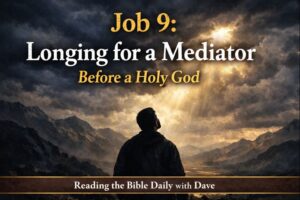⏱️ Estimated Reading Time: 3 min read
Revival According to the Bible: A Sovereign Work of God
Welcome back to Contending for the Word. This month, we’re exploring what true revival looks like—and how to discern it from what is false. Our focus today is on understanding revival as Scripture defines it. Many in our day equate revival with emotional excitement, large gatherings, or dramatic experiences. But the Bible defines revival not as a spectacle, but as a sovereign work of God in renewing His people by His Word and Spirit.
Psalm 85:6 says, “Will you not revive us again, that your people may rejoice in you?” True revival begins not with man’s plans or emotions, but with God’s gracious action to awaken His people to His holiness, His Word, and His glory.
Revival Begins with God
Biblical revival always starts with God, not human effort. Throughout Scripture, we see that renewal comes when God’s people have drifted into sin or spiritual complacency, and He mercifully restores them. Revival is God breathing life where hearts have grown cold. It is His Spirit bringing conviction, repentance, and renewed affection for Christ.
In Psalm 80:18–19, the psalmist prays, “Then we shall not turn back from you; give us life, and we will call upon your name! Restore us, O Lord God of hosts; let your face shine, that we may be saved!” True revival begins when God’s people recognize their need for His renewing grace and cry out for His mercy.
Revival Centers on the Word
Every true revival in Scripture and history is marked by a return to God’s Word. In Nehemiah 8, the people gathered to hear Ezra read the Law, and as they listened, their hearts were pierced, leading to confession and worship. The Spirit of God always works through the Word of God to bring transformation.
Revival that bypasses Scripture is not revival at all—it is mere enthusiasm without truth. The Word cuts through false comfort, reveals sin, and restores right worship. When the Bible is opened, the Spirit breathes life, and God’s people are changed.
Revival Produces Repentance and Joy
True revival is not about noise, crowds, or emotional highs—it is about repentance that leads to joy. Psalm 85:6 connects revival with rejoicing: “that your people may rejoice in you.” Genuine renewal happens when sin is confessed, idols are torn down, and God’s people delight again in their Savior.
When revival comes, it does not elevate men or ministries—it magnifies Christ. It leads to humility, holiness, and love for God’s truth. The fruit is lasting because it flows from God’s grace, not human hype.
Conclusion
So, what is revival according to the Bible? It is God’s sovereign work of restoring His people through His Word, producing repentance, obedience, and joy in Christ. Revival is not something we manufacture—it is something we pray for. The Church does not need a new experience; she needs a renewed heart anchored in the old, unchanging Word of God.
May our prayer echo the psalmist’s: “Will you not revive us again, that your people may rejoice in you?” (Psalm 85:6).
For more from Contending for the word Q&A please visit our page at Servants of Grace or visit our YouTube.
Dave Jenkins is happily married to his wife, Sarah. He is a writer, editor, and speaker living in beautiful Southern Oregon. Dave is a lover of Christ, His people, the Church, and sound theology. He serves as the Executive Director of Servants of Grace Ministries, the Executive Editor of Theology for Life Magazine, the Host and Producer of Equipping You in Grace Podcast, and is a contributor to and producer of Contending for the Word. He is the author of The Word Explored: The Problem of Biblical Illiteracy and What To Do About It (House to House, 2021), The Word Matters: Defending Biblical Authority Against the Spirit of the Age (G3 Press, 2022), and Contentment: The Journey of a Lifetime (Theology for Life, 2024). You can find him on Facebook, Twitter, Instagram, Youtube, or read his newsletter. Dave loves to spend time with his wife, going to movies, eating at a nice restaurant, or going out for a round of golf with a good friend. He is also a voracious reader, in particular of Reformed theology, and the Puritans. You will often find him when he’s not busy with ministry reading a pile of the latest books from a wide variety of Christian publishers. Dave received his M.A.R. and M.Div through Liberty Baptist Theological Seminary.




